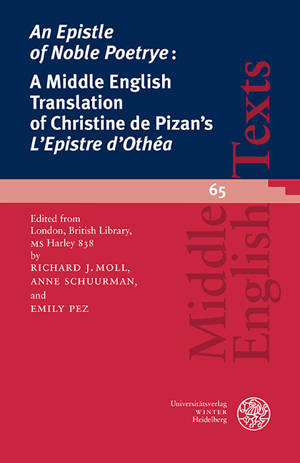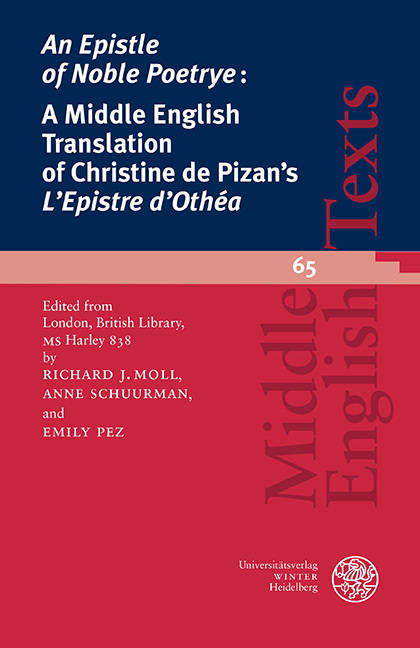
Je cadeautjes zeker op tijd in huis hebben voor de feestdagen? Kom langs in onze winkels en vind het perfecte geschenk!
- Afhalen na 1 uur in een winkel met voorraad
- Gratis thuislevering in België vanaf € 30
- Ruim aanbod met 7 miljoen producten
Je cadeautjes zeker op tijd in huis hebben voor de feestdagen? Kom langs in onze winkels en vind het perfecte geschenk!
- Afhalen na 1 uur in een winkel met voorraad
- Gratis thuislevering in België vanaf € 30
- Ruim aanbod met 7 miljoen producten
Zoeken
'An Epistle of Noble Poetrye
'A Middle English Translation of Christine de Pizan's 'Epistre d'Othea': Edited from London, British Library, MS Harley 838
€ 117,45
+ 234 punten
Omschrijving
'An Epistle of Noble Poetrye' is a late-fifteenth-century English translation of Christine de Pizan's 'L'Epistre d'Othea' (ca. 1400). The 'Epistle' survives in London, British Library, MS Harley 838, a family volume that passed from Anthony Babyngton (who probably acted as copyist) to his great-grandson and namesake who plotted the assassination of Elizabeth I. Presented as a letter of advice from the goddess Othea to the young Hector of Troy, the work draws on two distinct traditions: the glossing of Roman myth and the encyclopedic gathering of maxims and aphorisms from authoritative sources. In one hundred brief verses, Othea alludes to narratives that might guide Hector's behaviour. Each verse is followed by a prose 'Glose' and 'Moralyte' that explain the chivalric and spiritual lessons to be drawn from the myth. This is the first critical edition of the Middle English text to include a discussion of Christine's original text and the techniques of the translator, a study of the Epistle's codicological context, and an analysis of the language of the scribe. The text is followed by a commentary, glossary, index of names, and bibliography.
Specificaties
Betrokkenen
- Uitgeverij:
Inhoud
- Aantal bladzijden:
- 173
- Taal:
- Engels, Middelengels
- Reeks:
- Reeksnummer:
- nr. 65
Eigenschappen
- Productcode (EAN):
- 9783825349653
- Verschijningsdatum:
- 19/07/2022
- Uitvoering:
- Paperback
- Formaat:
- Trade paperback (VS)
- Afmetingen:
- 155 mm x 234 mm
- Gewicht:
- 3438 g

Alleen bij Standaard Boekhandel
+ 234 punten op je klantenkaart van Standaard Boekhandel
Beoordelingen
We publiceren alleen reviews die voldoen aan de voorwaarden voor reviews. Bekijk onze voorwaarden voor reviews.








